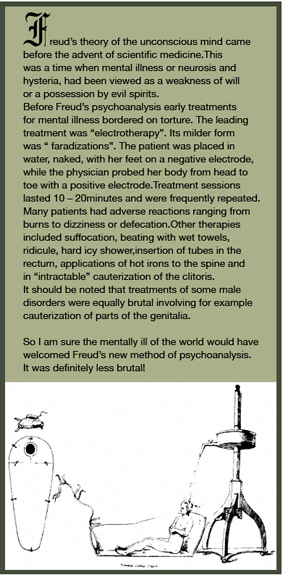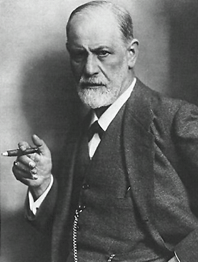|
[?]Subscribe To This Site
|
|
Interpretation Of Dreams
”Interpretation of Dreams” is his most influential publication. Published in 1899, this volume dealt with topics unconventional for his day.
Sigmund was interested in the unconscious mind in a day when people did not even believe there was such a thing as an unconscious and studies were only carried out on the conscious mind.
In his book Freud established that the “unconscious” mind, created in childhood is continuously operating in both normal and abnormal minds. And that Dreams allowed the best access to this unconscious life.
“ The interpretation of dreams is the royal road to a knowledge of the unconscious activities of the mind.” Sigmund Freud in “The interpretation of Dreams”.
He understood the importance dreams played, due to the fact that his patients were constantly making reference to their dreams. And he was able to establish a connection between their dreams and their symptoms.
He thus developed a new technique for greater access to the unconscious mind, called free association.
He used this technique in trying to get his patients to talk freely with him about the content of their dreams. This process was believed to help patients deal with repressed conflicts, especially childhood traumas.
Not only was this technique used on his patients but was also used to decipher his own dreams. The culmination of all this research was the understanding that dreams are actually disguised expressions of unconscious wishes.
Psychoanalysis
Freudian psychoanalysis had two main concepts:
1. The concept of the psychological unconscious
To explain the existence of mental illness he spoke of a willfully hidden part of the mind. This unconscious is where thoughts found expression in slips of the tongue and in dreams of both mentally ill and normal people.
He believed that mental illness in adults was the result of some repressed child hood incident or disgusting thought. And although at the time there is no effect, it lies dormant and is unconsciously awakened years later and expressed as a symptom.
2.Repressed sexuality
The concept that all repressed unconscious thoughts were essentially sexual in nature, and these sexual wishes, primarily childhood sexual wishes lay at the heart of mental illness as well as much of the rest of human behaviour.
From its inception, psychoanalysis became the foremost theory of human psychology. As well, it became an important method of psychiatric treatment, which today currently has thousands of practitioners all over the world.
The application of psychoanalytic thinking has had a major impact on the world we know today.
His theories were widely praised and gained much interest. However there were many skeptics, including another famous founding dream psychologist Carl Jung.
Even today, thought most people wouldn’t know it, we are speaking Freud’s language. Statements such as defense mechanisms, Freudian slip, dream symbolism, repression and transference were all Freud’s vocabulary.

Later he developed his field of psychoanalysis far beyond his original scope. Defining different levels of the unconscious.
What started out, as a means of treating mentally ill patients, became a general science of the mental process through which greater understanding of human personality has been achieved.
Sigmund died on 23rd September 1939.
Since then psychoanalysis has spread widely throughout the western world, particularly in the United States, where it has influenced psychiatric thinking more than in any other country.
Modern experimental physiology of the dream has meanwhile confirmed many of the hypotheses of Freudian dream psychology.
However, Not all psychologists have believed in the unconscious, nor do all value sex so highly, or agree with Freud’s interpretation of childhood sexuality.
Although we have moved well forward from Freud’s position on dream interpretation, there can be no denying that his revolutionary work into the unconscious mind paved the path for where we are today.
Book Recommendations
Return from Freud to Dream Research




